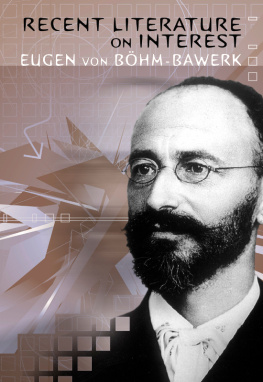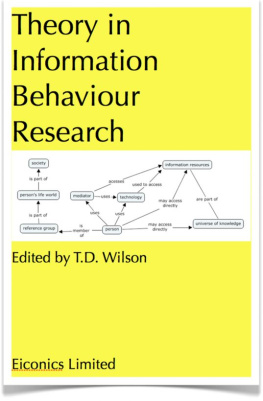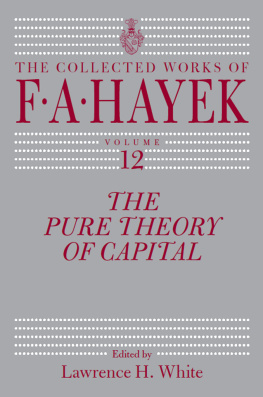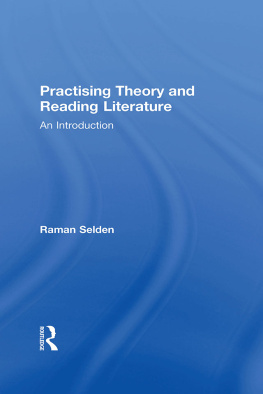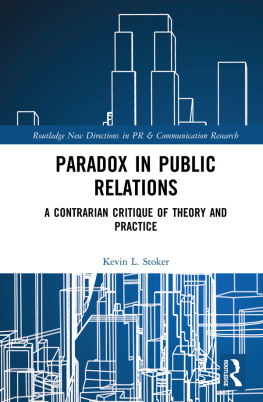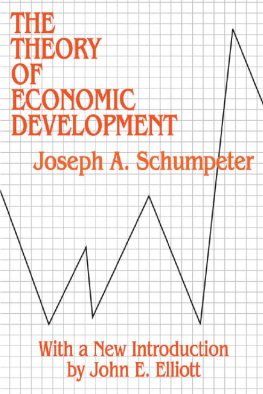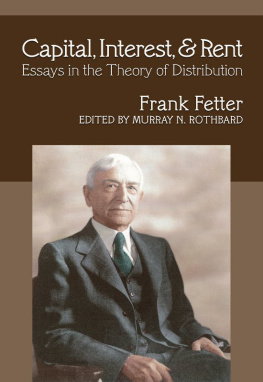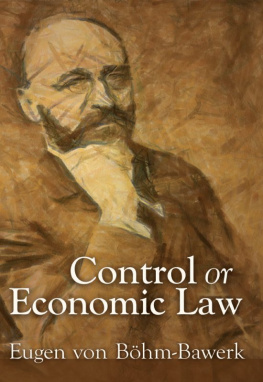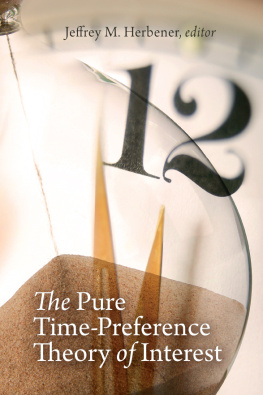RECENT LITERATURE
ON
INTEREST
(18841899)
A SUPPLEMENT TO CAPITAL AND INTEREST
BY
EUGENE v. BHMBAWERK
AUSTRIAN MINISTER OF FINANCE, AND HONORARY PROFESSOR OF POLITICAL
ECONOMY IN THE UNIVERSITY OF VIENNA
TRANSLATED BY
WILLIAM A. SCOTT, PH.D.
DIRECTOR OF THE SCHOOL, OF COMMERCE AND PROFESSOR OF ECONOMIC
HISTORY AND THEORY IN THE UNIVERSITY OF WISCONSIN
AND
PROFESSOR DOCTOR SIEGMUND FEILBOGEN
UNIVERSITTS-DOCENT IN THE UNIVERSITY OF VIENNA
New York
THE MACMILLAN COMPANY
LONDON: MACMILLAN & CO., LTD.
1903
All rights reserved

COPYRIGHT, 1903,
BY THE MACMILLAN COMPANY.
______
Set up, electrotyped, and published September, 1903.
Norwood Press
J. S. Cushing & Co.Derwick & Smith Co.
Norwood, Mass., U.S.A.
TRANSLATORS PREFACE
THIS little volume is intended as a supplement to the admirable translation of the first edition of Professor Bhm-Bawerks Geschichte und Kritik der Capitalzins-Theorien,,, given to the world by Professor William Smart of Glasgow in 1890. During the twelve years since this notable contribution to the critical literature of economic science has been available to English-speaking students, great progress has been made in the realm of economic theory, and for this Bhm-Bawerk and Professor Smarts translation are in no slight degree responsible. Whatever may be the final verdict of science regarding the agio theory, no one can doubt that the splendid example of criticism and analysis which is contained in Bhm-Bawerks work has raised theoretical discussion to a higher level and has been a constant and powerful stimulus to investigation in this field.
had already been directed along practically the same line as that of Jevons and the Austrians, and a new generation of young economists had just entered the field. Bhm-Bawerks masterly treatise gave support and encouragement to the former, and guidance and stimulus to the latter. It has been discussed over and over again in the courses in economic theory and in the economic seminaries of the country, and it is safe to say that no candidate for the doctorate in economics during the last twelve years has been absolved from the requirement of familiarizing himself with this work.
Abundant proof of Bhm-Bawerks influence is furnished by our literature. A glance at the files of the Political Science Quarterly, the Quarterly Journal of Economics, and the Annals indicates that a large proportion of the articles treating of economic theory are either directly upon some phase of Bhm-Bawerks work or theories, or have been clearly influenced, if not directly inspired, by them. Of the books on economic theory which have appeared during the last twelve years, not one that I can recall fails to take account of his work, and few, if any, of them fail to show the effects of his influence. It is impossible to say as much as this of any other book or any other man. Great as has been Marshalls influence, it has not approximated Bhm-Bawerks either in scope or intensity.
In 1900 the second edition of the Geschichte und Kritik der Capitalzins-Theorien appeared, and the present volume contains in its nine main chapters a translation of the Appendix, in which Bhm-Bawerk reviews the literature on interest which had appeared since 1884, the date to which the first edition translated by Smart brought the subject. In this preface we propose to give a summary of the most important of the other additions contained in the second edition. These are the
The Preface of the second edition treats chiefly of the authors defence of his method against the strictures of Alfred Marshall and of the late Francis A. Walker. These men had charged Bhm-Bawerk with misinterpreting many of the authors whom he criticised in Capital and Interest, claiming that he frequently mistook blunders of expression for errors of judgment. Walker was a firm adherent of the productivity theory, and was unable to believe that any really able thinker could have sought for an explanation of interest in any other direction. He, therefore, denied the separate existence of the abstinence and the use theories. He claimed that the authors of these so-called theories intended them only as a social justification of interest, and did not themselves mistake them for adequate explanations of the causes of this phenomenon. In this connection he mentioned especially Hermann, Karl Menger, and Senior.
Professor Marshall finds the explanation of interest in the coperation of what he calls the productiveness and the prospectiveness of capital, the former determining the demand for
In reply, Bhm-Bawerk says that the question at issue between himself and such critics as Walker and Marshall does not so much concern the interpretation and estimation of the views of other authors as the real essence of the interest problem, and the requirements for its solution. Regarding what the authors criticised really meant, he is quite willing to leave the decision to the intelligent readers of his book, for whose benefit he has very often quoted their exact words; but in justification of his view of the nature of the problem of interest, and the conditions necessary for its solution, he submits some characteristic statements of Walker and Marshall to analysis and criticism.
He disposes of Walker in a single paragraph. Referring to his statement regarding the teachings of Hermann, Menger, and Senior that they thus reached a social justification of interest which no one of them probably ever mistook for a scientific ascertainment of the cause of interest, and that on account of their blunders in expression Bhm-Bawerk ascribed to them independent, deeply thought-out theories which they never held, our author says: I do not think that I need waste a single word to prove that, on the contrary, it would have been most ungenerous, and for a true historian absolutely impossible, to have simply obliterated the use and abstinence theories from the history of the development of interest theories and to have drawn the old story of the productivity theory from the most widely differing methods of explanation, or, more accurately, to have forced that interpretation upon them.
The criticism of Marshall bears upon two points chiefly. In Bhm-Bawerks opinion he overestimates the explanatory power of the coperation of productiveness and prospectiveness, and is deceived regarding the actual relation in which the different groups of theories stand to this coperation. On the first point Bhm-Bawerk refers to a passage in the chapter on the eclectics, in which he says that no impartial observer could fail to see that interest is in some way connected with the productivity of capital, and with the abstinence required for saving, but such an observation, he says, comes far short of an explanation of interest. It may be compared to the observation that a rainbow appears whenever the sun strikes a rain-cloud at a certain angle. No one would regard this as a scientific explanation of the rainbow. It is the duty of science to point out the exact connection between this apparent cause and its effects, and the explanation would be very different according as the scientist assumed the undulatory or the emission theory of light. In like manner, productiveness and prospectiveness furnish no explanation of interest. They constitute only the framework of an explanation. The problem is to show the connection between these facts and interest.
The injustice of Marshalls charges and his evident misunderstanding of Bhm-Bawerks real attitude toward the authors he criticises is further shown by reference to certain passages in the first edition in which our author pointed out the affinity between the use and the productivity theories. In one place he said: This theory [the use theory] assumes capital to be productive. Again, on page 187, he said: The relation of use theories to the productive power of capital will not, however, be found stated so clearly in the writings of their representatives as I have thought necessary to state it. On the contrary, indeed, appeals to the productive power of capital long accompany the development of the use theory proper, and we are very often left in doubt whether the author relies, for his explanations of surplus value, more on the productive power of capital or on the arguments peculiar to the use theory.

